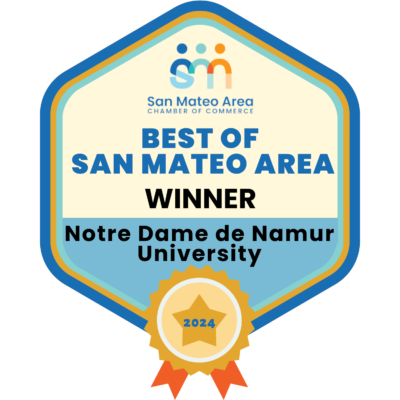
Earn Your MBA With a Cybersecurity Concentration
100% Online Program
Every day, organizations face new digital threats that can shake their foundations. But here’s the truth: while technical experts can build firewalls, it takes visionary leaders to build truly resilient organizations. Through this MBA with a concentration in Cybersecurity, students will develop the strategic mindset and leadership capabilities to protect what matters most – their organization’s future, reputation, and success. The MBA concentration in Cybersecurity is designed to fit into a one-year online MBA program for any MBA student, regardless of their background.
Why is NDNU partnering with Rize for the Cybersecurity Concentration?
Cybersecurity is a vast field with many entry points and roles within it. The Workforce Framework for Cybersecurity (NICE Framework) helps employers build their cybersecurity workforce by providing a standardized language around cybersecurity roles and tasks, applicable across all sectors. Rize’s MBA Cybersecurity program was designed with this framework in mind, guiding students to target jobs in the following areas:
- Oversight and Governance (OG): Provides leadership, management, direction, and advocacy so that the organization may effectively mitigate cybersecurity-related risks to the enterprise and conduct cybersecurity work.
- Protection and Defense (PD): Protects against, identifies, and analyzes risks to technology systems or networks. Includes investigations of cybersecurity events or crimes related to technology systems or networks.
OG and PD managerial-type roles, although largely non-technical, are some of the higher-paid positions within cybersecurity. In our program, students will learn to think big picture about cyber management and strategy to protect their organizations from the most pressing threats and cybercrimes. They will also become literate about the function of other roles in the NICE framework—it is the combination of these roles, not any single role alone, that leads to effective cybersecurity within organizations. Graduates will be ideally positioned to move into these cybersecurity roles at a time where they’re needed most.
For more information regarding the NDNU Rize partnership Click Here
Why Cybersecurity?
Businesses cannot survive today without digital services. These range from companies trying to advertise to customers (big data users) to hospitals that use electronic medical records to keep track of patient status. Threat actors can and do take down our IT services in various ways, ranging from data theft (data breaches) to denial of service (ransomware) that can cause a grinding halt to operations.
The risk of dangerous threat actors has risen alongside our global interconnectivity. Cybersecurity efforts have been increasing, but data breaches continue to increase year-on-year, with a 20% increase in data breaches from 2022 to 2023. According to the 2023 ISC2 Cybersecurity Workforce Study, 75% of cybersecurity professionals view the current threat landscape as the most challenging it has been in the past five years—yet only 52% believe that their organization has the tools and people needed to respond to these cyber incidents, which explains why organizations are willing to pay great salaries to attract and retain cybersecurity talent.
The Bureau of Labor Statistics reports that Information Security Analysts have a median wage of $120,000 in 2023 and are projected to grow 32% in the next decade. And even more opportunity awaits further up the ladder: Chief Information Security Officers (CISOs), for example, make an average of $244,565—with some drawing pay packages of over a million.
With 93% of organizations having two or more identity-related breaches in the past year, businesses today must prepare for a future in which they must defend against and be resilient to the impacts of cyberattacks. An MBA concentration in cybersecurity prepares students to step into lucrative and high-impact roles that both enhance overall business acumen and bring desperately needed security value to almost every industry.

Program Mission Statements
Chart Your Course in Cybersecurity Leadership: You don’t need to be a coding expert to lead in cybersecurity. Our MBA program empowers you to make strategic decisions that protect and propel your organization forward.
Build Tomorrow’s Resilient Businesses: In a world where digital risks evolve daily, you’ll gain the insights to not just respond to threats, but to build organizations that thrive despite them. Find your unique potential and stand out from the crowd by pursuing an MBA with a concentration in Cybersecurity from Notre Dame de Namur University – your pathway to a fulfilling, in-demand career at the forefront of technological development.
Connect Business Strategy with Security: See the bigger picture beyond technical solutions. With Notre Dame de Namur University’s MBA program and a concentration in Cybersecurity, you’ll learn to align security investments with business goals—ensuring your organization remains both protected and profitable.
Turn Challenges into Leadership Opportunities: Where others see risk, you’ll see opportunity. Develop the confidence and expertise to guide organizations through digital transformation while ensuring their security.
Admissions Information
To be admitted into the MBA program, students need to meet the following requirements:
- A four-year bachelor’s degree or the equivalent from a regionally accredited institution
- A cumulative grade point average of 2.5 or better
- Two academic and/or professional recommendations
- One or more courses in each of the foundation areas of accounting, economics, statistics, and math.
International students should also refer to the general graduate admission requirements.
Program Learning Outcomes
- Evaluate and create comprehensive governance, risk management and compliance plans that align with corporate performance goals, follow key regulations, and enhance organizational resilience.
- Effectively communicate technical and policy information about cybersecurity challenges to effect organizational security measures.
- Assess career opportunities and key sectors relevant to cybersecurity.
- Evaluate security solutions to meet the unique needs of IT and OT systems, cloud environments, data storage, and IoT networks, aligning with business goals.
- Demonstrate strategic leadership in cybersecurity by proactively planning, implementing, and managing comprehensive security measures.
- Identify and operate open-source hacking tools to recognize and address security vulnerabilities in accordance with ethical hacking principles.
Key Skills You'll Gain:
- Cyber Risk Strategy
- Align security with business goals
- Network Security
- Protect digital assets
- Governance and Compliance
- Ensure regulatory adherence
- Ethical Hacking
- Identify and mitigate vulnerabilities
The Role of a Cybersecurity Business Leader:
- Develop Cyber Risk Strategies
- Align security policies with business objectives
- Mitigate Threats & Breaches
- Create resilient systems to prevent downtime
- Ensure Compliance and Governance
- Keep organizations aligned with industry regulations
- Bridge The Gap Between Security and Leadership
- Effectively communicate risks and solutions to executives
Rize Concentration (3 Units / 8-Week Courses)
BUS 4700 – Information Governance, Risk Management, and Compliance
- Covers essential skills in corporate governance, risk management, and compliance, covering board responsibilities, risk identification, and audit practices through real-world case studies.
BUS 4710 – Network Architecture for Cyber Managers
- Offers an understanding of information and operational technology principles, covering network architectures, cloud computing, data management, and the applications and limits of machine learning for predictive maintenance and process optimization.
BUS 4720 – Cyber Risk Management and Strategy
- Covers essential principles and frameworks, teaching students to identify cyber threats, design policies, and develop incident response plans to manage and mitigate cyber risks.
BUS 4730 – Executive Cyber Defense
- Offers hands-on training in ethical hacking techniques, using open-source tools and practical simulations to identify and mitigate security vulnerabilities.
Course Highlights
Information Governance, Risk Management, and Compliance: Transform complex regulations into clear action plans. You’ll learn to build governance frameworks that protect your organization while enabling innovation and growth. Real-world case studies show you how leading companies navigate these challenges.
Network Architectures for Cyber Managers: Decode the technical landscape without getting lost in the details. Master the essentials of modern infrastructure – from cloud computing to IoT – so you can make informed decisions about your organization’s digital future.
Cyber Risk Management and Strategy: Move from reactive to proactive. You’ll develop strategies that anticipate threats, create response plans that work under pressure, and learn how to turn security investments into business advantages.
Executive Cyber Defense: Step into the mindset of both defender and attacker. Through hands-on simulations, you’ll uncover vulnerabilities the way real threats do – and learn to stop them before they strike. No coding experience needed.

Subject Matter Expert
Dr. Gregory Falco is an Assistant Professor at Cornell University’s Sibley School of Mechanical and Aerospace Engineering and the Systems Engineering Program, specializes in cybersecurity. He earned his PhD from MIT, where his doctoral research in cybersecurity was funded by NASA’s Jet Propulsion Laboratory. Before his tenure at Cornell, he held positions at Johns Hopkins and conducted postdoctoral research at Stanford and MIT. He directs the Aerospace ADVERSARY Laboratory, focusing on creating autonomous, secure space infrastructure, with support from DARPA, NASA, and other agencies. Recognized by Forbes 30 Under 30 and as a DARPA RISER, Falco’s research has led to impactful patents and startups. He also consults for major tech and defense companies. Prior to his academic career, he was an executive at Accenture.

Cybersecurity Concentration FAQ’s
Cybersecurity is a rapidly developing field that has matured significantly in the past decade. Companies have upped their cybersecurity budgets, more advanced cybersecurity products have been developed, and the breadth and volume of job opportunities have expanded rapidly, mostly in roles that require no coding at all.
To ensure this program prepares students for this breadth of roles, no courses in this Cybersecurity program have coding prerequisites. And while data extraction languages such as SQL and principles of algorithm design are explored sufficiently to build proficiency in penetration testing, encryption protocols and data extraction, no coding skills are taught in the courses.
There are four reasons for this:
- Most Cybersecurity roles do not require any coding skills. As highlighted in this 2022 Up Guard article, most roles in the modern field of Cybersecurity require no coding skills. Similarly, CyberDegrees.org recognizes that while coding is a valuable skill for Cybersecurity roles, most entry-level roles require no coding. This is also supported by the NICE cybersecurity workforce framework, where 4 of the 6 categories (Collect & Operate, Investigate, Operate & Maintain, Oversee & Govern) predominantly contain roles that do not apply coding skills.
- Most Cybersecurity certifications do not require any coding skills. None of the certifications listed in the Up Guard article above examine any coding skills. CompTIA A+, one of the certifications that this program helps prepare students for, does not require or examine any coding skills.
- Technical proficiency is not equivalent to coding proficiency. This program is deeply rooted in technological tools and concepts. In that way, it is a very technical degree, but it is not a coding degree. Even the more technical cryptographic concepts examined by popular certifications are code-agnostic. While cryptographic protocols, algorithms and solutions are fundamentally built with code, and experience with coding certainly affords students some advantages in conceptualizing cryptographic topics, they are not required to critically assess and select different solutions. Additionally, many attack vectors that hackers exploit are not technical in nature (e.g. phishing).
- Removing coding requirements makes the broad field of cybersecurity more accessible. The field of cybersecurity is growing rapidly, mostly in roles that do not require any coding skills. Coding skills can present a significant hurdle to many students and prevent talented, capable candidates from entering the cybersecurity industry.
Information security is traditionally more theoretical and code-oriented, focusing on the policies and application of data protection (e.g., multi-factor authentication, principle of least privilege) from unauthorized access to ensure its integrity and availability. Cybersecurity is wider ranging and technical in nature. Cybersecurity is primarily concerned with technical countermeasures (e.g., network analyzers, firewalls, penetration tests, digital forensics) used to defend networks and endpoint devices from cyber-attacks.
This MBA program equips students with the knowledge and skills to pursue various management and strategic roles in cybersecurity. Graduates are prepared for positions such as:
- Cybersecurity Manager: Overseeing cybersecurity teams and implementing security measures to protect organizational data and infrastructure.
- Information Security Analyst: Analyzing and responding to security breaches, conducting risk assessments, and ensuring compliance with security standards.
- Chief Information Security Officer (CISO): Eventually, with enough experience! Leading the overall cybersecurity strategy of an organization, developing policies, and ensuring the protection of digital assets.
- Risk Management Specialist: Identifying, evaluating, and mitigating cyber risks, and developing comprehensive risk management strategies.
While this program provides a strong foundation in cybersecurity management, it does not focus on the highly technical or specialized aspects of the field that other programs might cover. Specifically, it does not prepare students for roles such as:
- Cryptographic Programmer: Although students are exposed to general encryption protocols, the curriculum does not prepare them for future careers as cryptographic programmers developing encryption algorithms, which requires education and training in advanced, discrete mathematics and programming languages.
- Penetration Tester/Ethical Hacker: Requires in-depth technical skills in hacking techniques, tools, and methodologies to identify and exploit vulnerabilities in systems. Note: The Ethical Hacking course covers this topic from a managerial perspective and, while including some practical exercises, gives them empathy for and literacy around the challenges of ethical hacking; it does not train students to become ethical hackers per se, a role that is more technical than a single course could cover.
- Security Software Developer: Focuses on developing secure software applications, requiring strong programming skills and an understanding of secure coding practices.
In the cybersecurity field, experience is invaluable. Even with an MBA, securing advanced management positions often requires significant practical experience in cybersecurity. Hands-on experience helps in understanding the complexities of cyber threats, the effectiveness of various security measures, and the practical challenges of implementing security policies.
While this MBA program provides the practical knowledge and strategic insights necessary for management roles, students should complement their education with real-world experience as much as they can, particularly if they want to move into a management role but have no experience in the field at the time of receiving their MBA. Attending networking conferences, getting involved in cyber communities, and getting internship experience can all be extremely valuable kick starters in one’s cyber career.
Career Opportunities In Cybersecurity
State Authorization for Online Programs
The Department of Education requires that institutions offering online or distance learning programs outside of their home states must seek authorization to operate from regulatory bodies in those states. Each state has a different set of requirements when it comes to allowing out-of-state colleges and universities to offer online degree programs to its residents.

